.
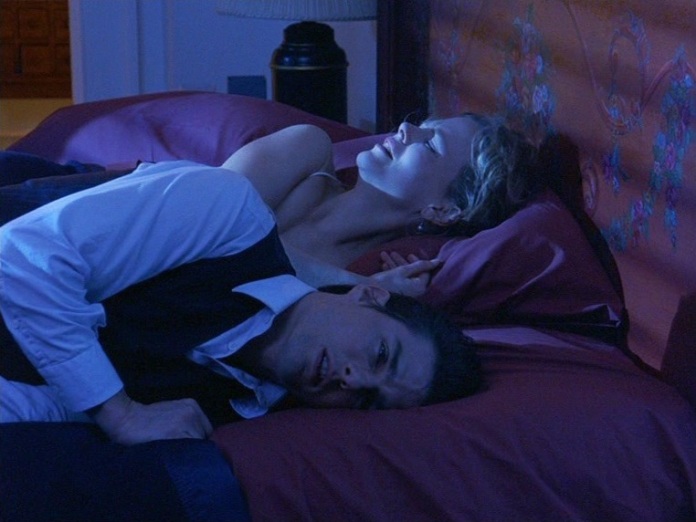
Director: Stanley Kubrick
By Roderick Heath
Legendary and lauded as most of them have become, few of Stanley Kubrick’s later films landed immediate punches with viewers. 2001: A Space Odyssey (1968) took time to find an audience, A Clockwork Orange was so controversial in its time Kubrick removed it from British cinemas, Barry Lyndon (1975) was written off by many as a prestige-seeking objet d’art, and even The Shining (1980) underperformed badly on first release, catching neither the Oscar-bait nor the Friday the 13th (1980) crowds.
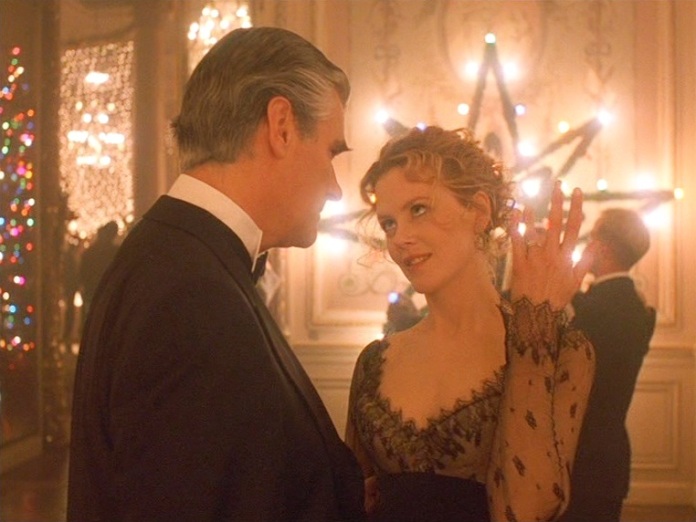
And everyone knows that Kubrick’s final film, a mordant and menacing sexual satire, gained a collective shrug from general movie-goers, even after the death of the director and the pairing of then-married superstars Tom Cruise and Nicole Kidman earned it an avalanche of hype. I found Eyes Wide Shut a deliciously weird, funny, beautiful, and original piece of work, then and now. Eyes Wide Shut did for writer Arthur Schnitzler’s Traumnovelle what Apocalypse Now did for Joseph Conrad—transpose it to the modern day without ejecting its crucial flavour of timeless, mystified sensuality, filtered through a cutting sarcasm that was Kubrick’s own.
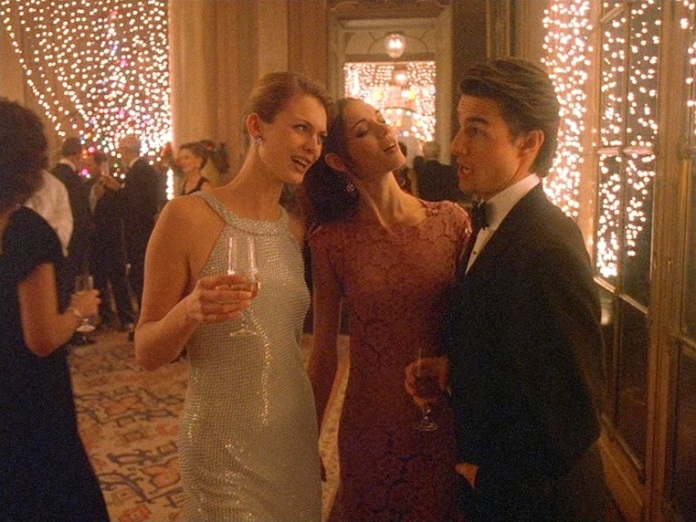
Frederic Raphael, who wrote the screenplay with Kubrick’s aid, had tackled similar themes, with some similar narrative touches, in Two for the Road (1967). Kubrick’s ironic-realist approach always shaded into a deep stylisation, and Eyes Wide Shut was stupidly criticised for being unreal-seeming when such was the whole damn point of a film based on a “dream novel.” But it’s a judgment I also take issue with: I can think of very few better films that capture with accuracy the haunted feel of a great city late at night as we follow Cruise as he stalks the frigid streets, lost in mists of sexual jealousy and aching fear.
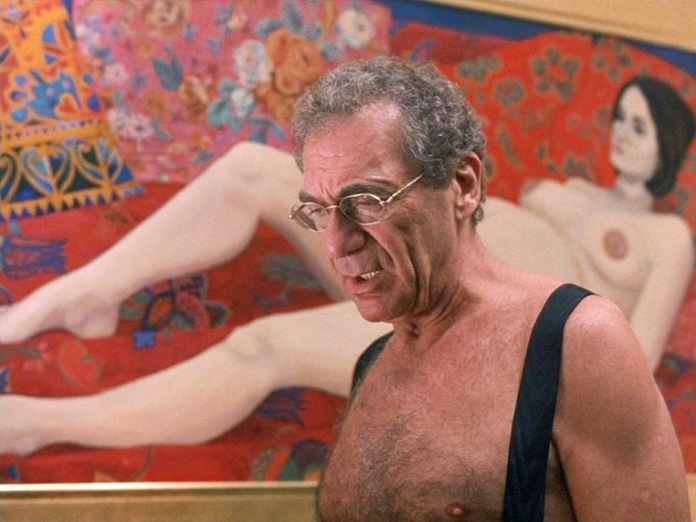
Sold as a sexy thriller, which means, in standard terms, a tawdry morality play like Fatal Attraction, Kubrick’s swan song is closer in spirit to Italian horror films, Val Lewton (particularly The Seventh Victim, 1943), Ernst Lubitsch, and the Velvet Underground’s “Venus in Furs.” Eyes Wide Shut isn’t actually about sex—it’s about what it means to individuals and to couples and the anxiety it engenders, built around the basic joke that the top male movie star of his era can’t get laid. That would be Cruise, who plays Dr. William Harford, who can readily be seen (as Cruise did in his two other best roles after it, in Magnolia and War of the Worlds) one of his cocky ’80s golden boys getting a rude shock when it comes to growing up.
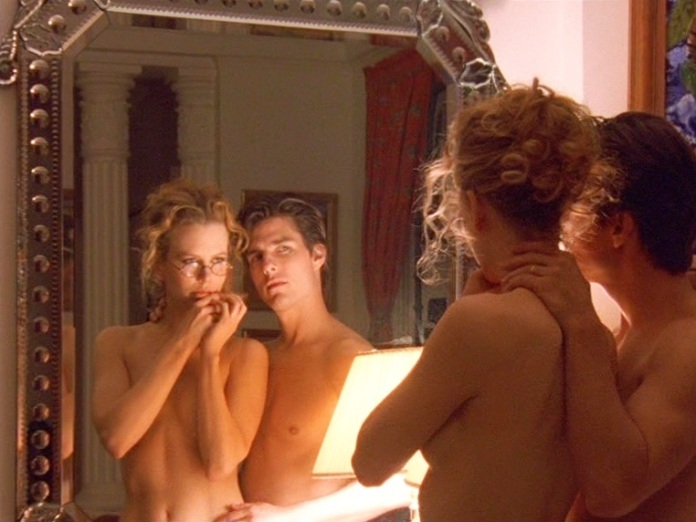
Fit, handsome, prosperous, and criminally self-satisfied, Harford and his wife Alice (Kidman) leave their gorgeous apartment and young daughter (Madison Eginton) for an evening at a party thrown by Bill’s wealthy, randy patient Victor Ziegler (Sydney Pollack) and his wife (Leslie Lowe). Bill encounters a friend who dropped out of med school, jazz pianist Nick Nightingale (Todd Field, before becoming a Kubrickian director), and playfully chats with two models (Louise J. Taylor and Stewart Thorndike) who try not so subtly to sell him on a threesome. Alice dances with the fishy Sandor Szavost (Sky Dumont), who, with gentlemanly affect and a strong whiff of sleaze, tries to make her.
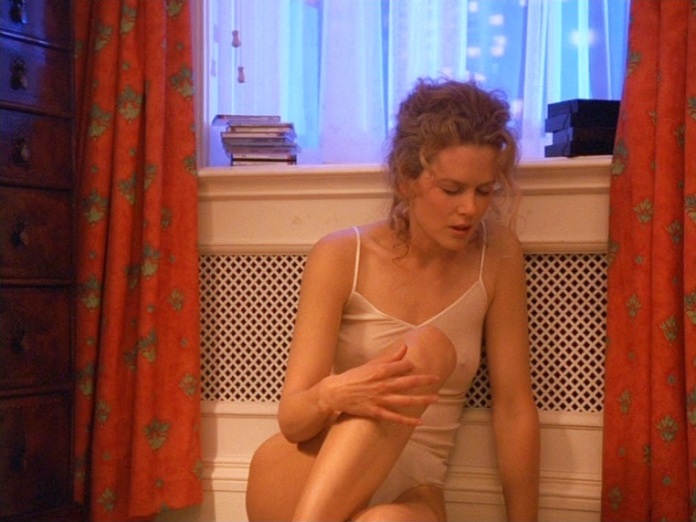
Bill is soon called upstairs to aid Ziegler, who is hurriedly putting on his clothes near a naked girl named Mandy (Julienne Davis) sprawled on a chair, almost dead from a drug overdose. She comes to, and Ziegler asks Bill not to speak about this, which Bill takes as all part of the business. Alice extricates herself eventually from her would-be lover’s arms, but suspects that Bill may have gone romping with the models, an anxiety that doesn’t reveal itself until the following night. After a day in which Bill works and Alice, an unemployed gallery curator, packs Christmas presents, they get stoned together. Alice taunts Bill with a story about her powerful attraction to a young naval officer she encountered a year before at a resort she and Bill visited.
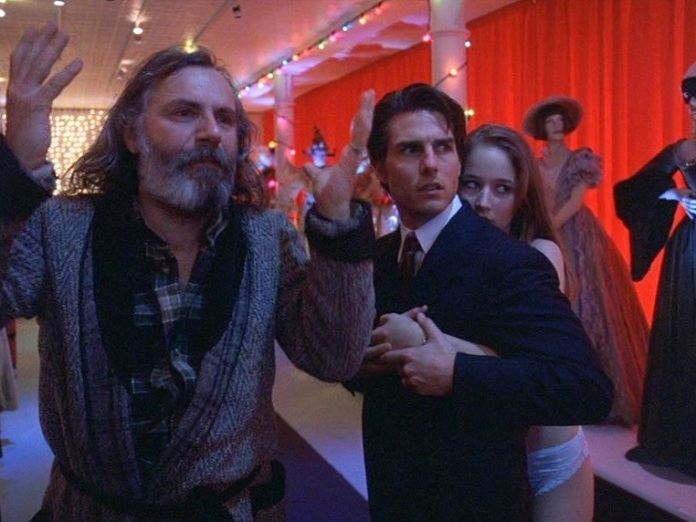
Before the discomfort of the revelation can be settled, Bill is called away to “show his face” at the apartment of one of his patients who has died, commencing a series of charged scenes in which Bill is confronted by distorting mirrors to his plight: the dead man’s daughter (Marie Richardson), who’s willing to throw away her fiancé for a professed love of Bill; the fur-clad, oddly named hooker Domino (Vinessa Shaw) he meets on the street, whose professional glaze slips in dealing with her good-looking, charming, slightly befuddled client; a European costumer, Milich (Rade Sherbedgia), who rents out his pubescent daughter (Leelee Sobieski) as a prostitute; and a gay hotel clerk (Alan Cumming) who swoons, figuratively, in his presence, not long after a mob of obnoxious frat boys have assaulted Bill on the street and hurled homosexual abuse at him. Most dizzying and bizarre of all, Bill crashes an orgy of a secretive cabal of society patricians, alerted by the intimations of Nick, who plays music for their hedonistic mock-religious rituals while blindfolded. Bill wanders through the mansion while dozens of black-draped, masked guests cavort in approximations of passion with the exquisite females provided for their entertainment.
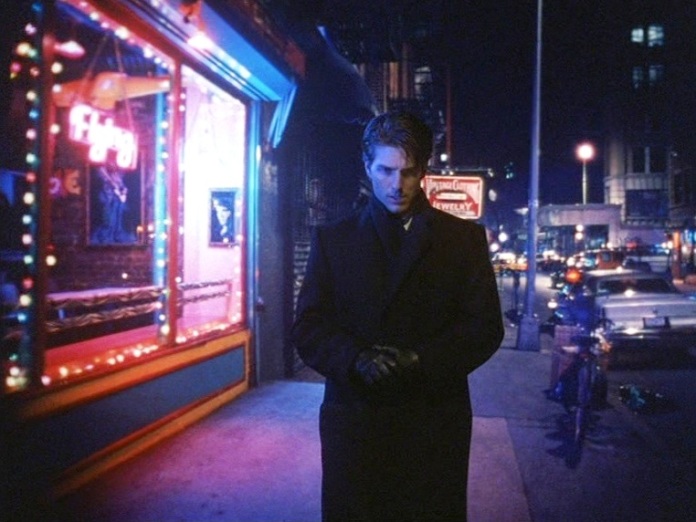
One of the faceless, lushly formed women chooses him as the assembled pair off, but seems to recognise him. She warns him to leave, but he’s soon hauled before the assembled hedonists and forced to remove his mask. Only the masked girl’s intervention seems to save him from a grisly fate, and Bill is ejected with a warning to keep his mouth shut. It’s a scene that evokes and exploits a deep anxiety, desire (both sexual and social) seguing into the needle-sharp moment of being revealed and humiliated. After Bill returns home, Alice awakens from a dream and recounts it to him. It is startlingly similar to his experience, and for Bill, the settled boundaries between life and fantasy, waking and dreaming, threaten momentarily to dissolve. In the clear light of day, Bill finds no solace: in retracing his steps, he finds Nick has vanished, receives another warning from the cabal, and soon suspects that an ex-beauty queen, found dead from an overdose, may have been his guardian angel from the orgy. He senses he might be pursued around town by what may or may not be malevolent agents.
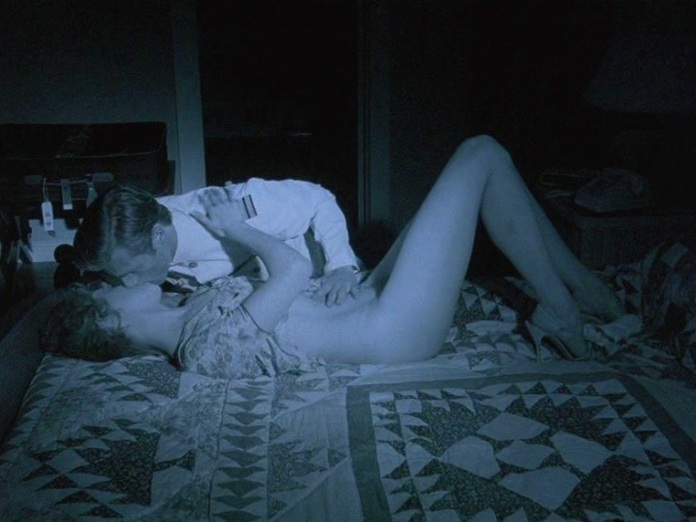
Like most of Kubrick’s other films, Eyes Wide Shut is indeed coal-black comedy, but the humour tends to die in the throat: the recurring gag that goes beyond a joke quickly enough is that while he gets come-ons from every direction, every flirtation Bill engages in, consciously or unconsciously, sees him frustrated or embarrassed. He withdraws from Domino when he gets a call from Alice; later, when he returns to visit her, he’s about to screw her roommate Sally (Fay Masterson) when she halts their tryst with the news that Domino has AIDS. The darkest reflection of his appetites comes with Milich and his daughter, who whispers a come-on in his ear and backs away in a provocative pose, and later appears at her father’s side as he explains he and her Japanese fancymen (Togo Igawa and Eiji Kusuhara) “came to another arrangement.” The film is, in many ways, a comedy of manners, and again like most of Kubrick’s films, it is about how social ritual masks games of power and desire, a method Kubrick initiated with the contrast of the elegant waltzers and the office politics that destroy hundreds of men, in Paths of Glory (1957), and evolved into more delicate and intricate shadings.
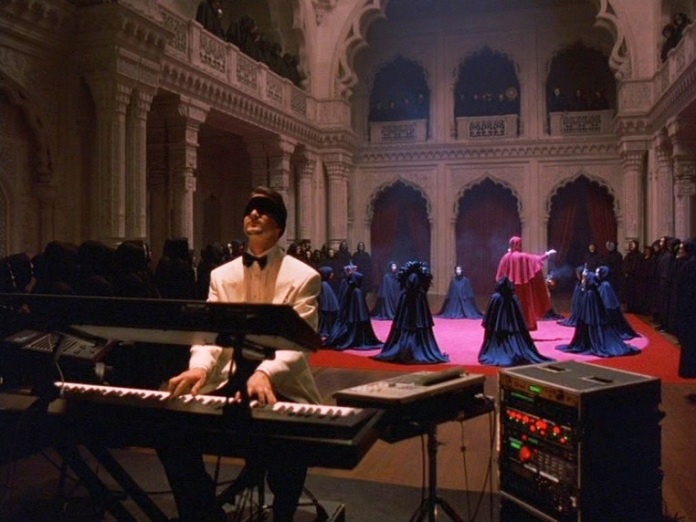
That Bill becomes the ultimate in uninvited guests is both the biggest and coldest of the string of humiliations he receives. The unmasking is also Bill’s “outing,” for a recurring counterpoint to his desire to reaffirm his masculinity that leads him into situations that rob him of it. He’s taunted as gay by rowdy, vicious young men, and becomes the object of Cumming’s obvious ardour. There’s a quality of vicious humour in using Cruise, so long associated with on-screen potency and off-screen rumours, and the narrative constantly moves to cut off both Bill the character and Cruise the actor from the usual recourses. He is transmuted from beaming, cocky would-be stud striding through the party with two women on his arms, to weeping, unshaven fool of fortune confessing every minor and major seamy act of the previous two days.
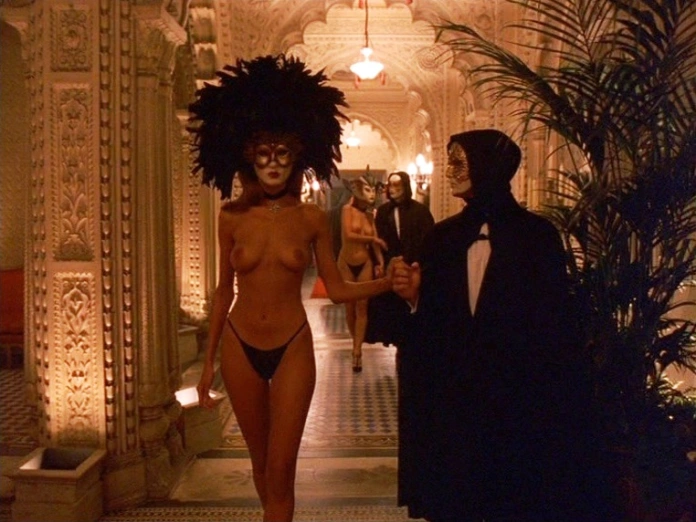
The great conspiracy that Bill considers unwinding proves to be little more than a bunch of rich wankers having a good time, as Ziegler, who was one of them, admits to get him to stop digging into what is nonetheless a potentially volatile situation. He awakens Bill to the fact that the dead girl, his saviour, whom he was able to recognise in the morgue from the colour of her eyes, was Mandy and that her death was, so he swears, her own stupid fault. It’s particularly galling for Bill considering that despite his mask, Mandy could recognise him, or least sense his outsider status. The long sequence between Ziegler and Bill is one for which Pollack received almost more praise at his death than he did for the films he directed. As was once said of Liv Ullman in Ingmar Bergman’s Hour of the Wolf (1966), Pollack cuts like a knife through the mouldy cheese of Bill’s self-absorption. Victor accuses Bill of spending the past two days in a metaphorical jerk-off. Ziegler’s admissions deflate Bill’s mounting panic and put a leash on—but do not seal away—the genie of erotic dicontent, as Bill’s journey has conclusively revealed a pattern of how people use one another in sexual situations for whatever motives and prices. Only in his marriage is there something more than a variety of economics involved.
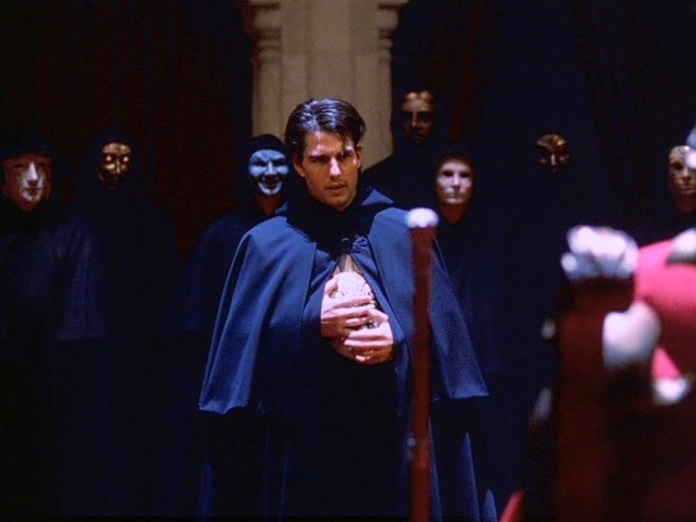
Eyes Wide Shut is also about marriage, its failings, frustrations, and intrinsic intensity; the shadow people lovers construct from each other and the damage that results from the demolition of those images; and the necessity of both the construct and the demolition for the survival of any union. Bill and Alice’s intimate moment after the first party sees them touching each other but admiring themselves in the mirror, trapped in a state of narcissistic self-contemplation by their experiences at Victor’s. Alice’s admission of her deepest temptation, which mingle desperate ardour both for another man and for her husband, sends him out to half-consciously replicate the journey, to provide himself with objects of desire, and then reject them for his wife. He, in his waking life, and she in her dream, tear apart the false versions of themselves in order to return to where they essentially began. I’ve never liked Kidman as an actress more than here, with her mordant deliveries in the hypnotically brutal confession scene, and her weary, frightened, but hopeful affect in the final few moments.
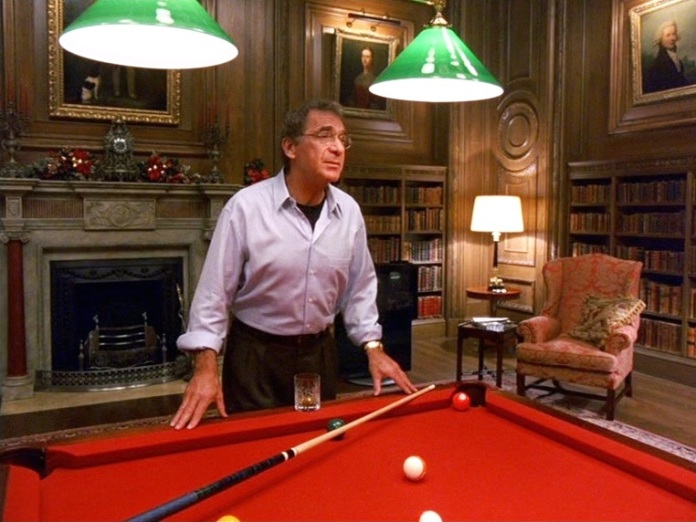
Kubrick’s visuals, festooned with shades of muted colour and embracing warmth contrasted with deep blues and evocations of a frigid northern city night, light Bill’s path between inside and outside, acceptance and rejection. Beneath the fastidious, facile realism of the details, the expressionist intent is readily apparent in the city sets that, like Val Lewton’s settings, vibrate with stylised liveliness. Kubrick had quoted Euro-horror before in The Shining, which utilised the fetishist visual patterns of Dario Argento with impunity, and Kubrick’s saturated colours and textures here again resemble Argento’s. The orgy sequence, with its sex-as-theatre dreaminess, clash of flesh and formal clothing, and psychedelic music, evokes many a work of Euro underground sex-gothic and surrealist cinema. It’s an aspect that many viewers seemed blind to, perhaps because Kubrick had always been assumed, despite the distorted expressionist violence and comedy and pop-art reflexes in Dr. Strangelove (1964) and A Clockwork Orange (1971) (and classical art in Barry Lyndon), to be a careful realist.
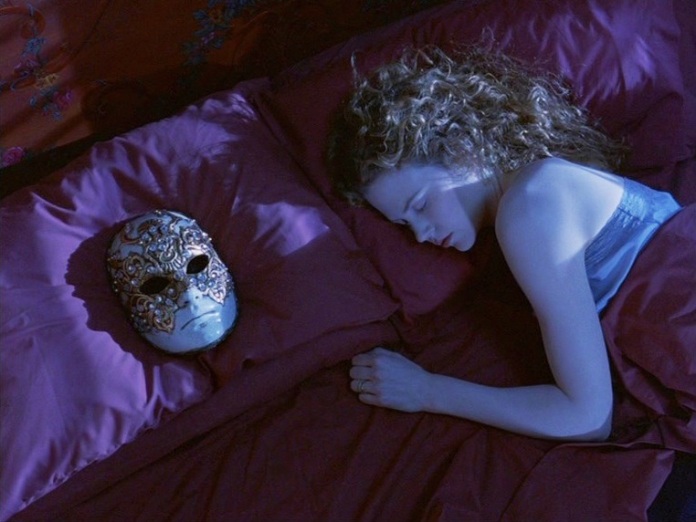
The film’s core musical theme is Shostakovich’s “Jazz Suite,” a cunning choice that fuses the lingua franca of America and Europe in a jaunty waltz time that contributes to the blurring of space and era. But as well as making its own felicitous quotes of other oeuvres, Kubrick readily referenced his own obsessions all the way through. His script for the unproduced Napoleon had a scene in which a young go-getter is ushered into decadent society to his shock and delight. Milich’s daughter is another Lolita. The film’s mix of formal elegance and impudent humour reflects how deeply the influence of Vladimir Nabokov, whose Lolita he filmed in 1962, seeped into Kubrick’s style. What is rare about Eyes Wide Shut and what made it a particularly lovely coup de grace, is the final, fecund warmth it tries to locate between Bill and Alice. It is able to approach the nature of human decency as well as corruption, leading to one of the greatest, pithiest, most meaningful final lines in any movie.

What a fantastic post! This film is really a stunner and you do an excellent job of unpacking all its layers. I think, after the initial indifferent reaction this film received, its reputation has steadily improved, at least among those who appreciate Kubrick in the first place.
I love the film’s unsettling, faintly surreal journey into a world where everything is sexual, and yet Cruise’s Dr. Bill is teased again and again, coming right up to the edge of sexual satisfaction only to have it denied him. Bill is a supremely sheltered man, with little conception of female sexuality: he’s so shaken up by what is, after all, a fairly mundane revelation. Women have fantasies too, women are sexual creatures too. This is enough of a shock to his system that he’s totally thrown out of his usual self-assurance and cockiness. That’s why the ending is so hopeful to me, why Kidman’s final line always puts such a smile on my face, beyond its obvious naughty resonance: it represents a chance for a new sexual maturity in this couple, a new status quo in which they each care about the other’s sexual desires.
LikeLike
I, too, am a fan of this film and agree with Ed that you really covered the waterfront about what makes this a particularly effective look at the perversion of sexual desire and, especially, Bill’s lack of understanding about female sexual desire. His encounters in the night are what one might call traditional approaches a man might have to a sex object–comforting a distraught woman who has fallen prey to Bill’s godlike physician persona; a hooker; and randy, foreign teenager and her obliging pimp-father; and an orgy of privilege in which heterosexual sex with only the finest prostitutes is a game. A mere flirtation, with a homosexual encounter is also fitting to a city sophisticate.
But ultimately, Bill knows very little about sex and especially about women. He has taken his world for granted, and is now paying the price. I agree that Kidman’s final line couldn’t be more perfect – she is the instigator of sex and resolver of their dilemma. It is she who has found her power in their relationship, a power which she was denied by merely being married, but never understood, her loyalty taken as a given because to Bill, marriage is her ultimate destiny as a woman. Look at the framing of the screencap in which Alice shows her wedding ring; does it get any more Virgin Mary than that?
I think this film didn’t resonate as well as it should have because the comedy was, as you said, something one eventually gags on. The line readings were as though in a dream, and that distortion was difficult for even me to wrap my head around. It’s worth the effort, though.
LikeLike
I remember seeing this when it came out and people walking out halfway through when it wasn’t the Tom Cruise film they were expecting (just what were they expecting?) but I loved and saw it a few times before it disappeared from theaters.
I also remember how it divided film critics in the US with the east coast ones upset that New York City didn’t look real and west coast ones not having a problem with the dream-like nature of the film.
The film (like all of Kubrick’s output) has aged well and I enjoy and appreciate it more every time I watch it.
LikeLike
J.D. – The theatre I saw it in was a falling-apart modern movie palace whose air conditioning was leaking and turned up way too high. I was enormously uncomfortable, but I had to see the movie through to the end
LikeLike
Heh. I know the feeling. I saw the same reaction when I went to see MAGNOLIA. The rain of frogs scene caused several moviegoers to walk out. I figured that would be the make or break scene for some.
LikeLike
I only have to add that years before it was available an a R1 version, I bought the British DVD to have a better idea of the film that Kubrick had intended. I did like the film when I saw it theatrically, but seeing it without the modifications to allow for a US “R” rating, made the film make more sense for me, at least on an intuitive level.
LikeLike
Am I wrong, Peter, but wasn’t the only modification the explicit sex in the orgy scene? I’m not sure how seeing that would necessarily clear anything up for those with problems with the film. Was there anything else excised?
LikeLike
EWS was released in Oz uncut as it was in Britain, so no complaints here. Apart from that Cruise et al swore black and blue that the cut everyone saw was the cut Kubrick wanted. As it is, the orgy scene is the only one with any explicit sex in it.
LikeLike
The only change was with the orgy scene. However, by eliminating the masking for the “R” rating, and allowing for a more explicit view of the activity, the display of sex becomes even less erotic and more detached, which is what I believe was Kubrick’s intent.
LikeLike
There’s a weird detail in the orgy scene that leapt out at me on this viewing: in one scene, there’s two of the masked women on a table 69’ing, except, of course, they’re still wearing the masks, so of course they’re not doing anything in truth, only play-acting the erotic act. That’s the whole sequence in a nutshell.
LikeLike